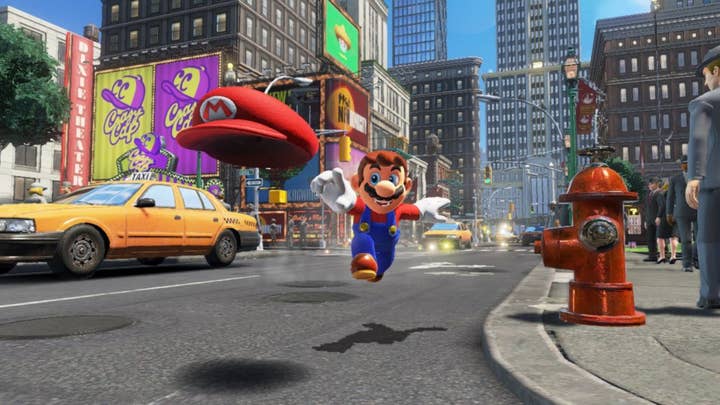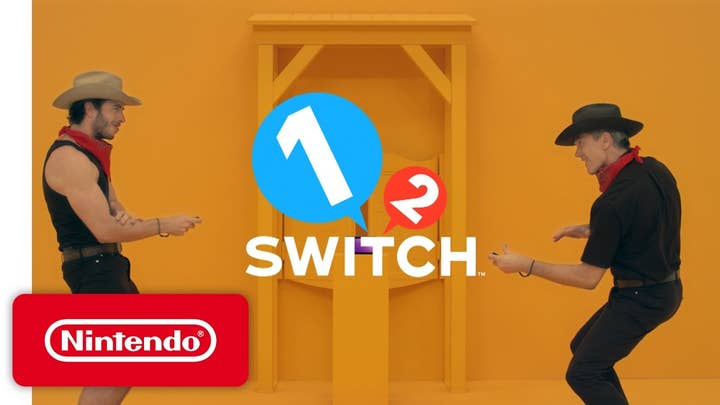Switch's challenge is unique software, not PS4 competition
Asking why people would buy a Switch over a PS4 is the wrong question; we should ask why PS4 owners would also want to own a Switch
There was no shortage of hot takes on Nintendo's new Switch console on offer this week, but reading through the coverage gave me a peculiar sense of disconnect. On the one hand, nearly every article I read in the English-language press suggested that Nintendo had messed up again; that in spite of how great some of the games for Switch look, the hardware is underpowered, overpriced, poorly positioned, uncompetitive and generally doomed to failure. On the other hand, glancing at Facebook or going out for a drink with friends exposed me to dozens of variations of "take my money, dammit" - a sentiment especially prevalent among Japanese friends and colleagues.
This could be read in two ways. Firstly, there's the possibility that Switch is going to face a very different climate overseas than it will in its home market. That's not unprecedented; consider that PlayStation Vita (and PSP before it) was vastly more successful in Japan than it was overseas, for example. Wii U has also fared better here than in the West, though it's hardly done gangbusters anywhere. On the other side of the coin, PlayStation 4 has underperformed in Japan compared to how it's done in the US and Europe. Switch seems well-positioned to solve certain problems - such as falling TV ownership among young demographics and the desire to use public spaces rather than private homes for multiplayer gaming - that are key to the Japanese market but don't exist to the same extent overseas. It's plausible, then, that the console will do very well in Japan while struggling in other markets.
The other possibility is that there's a misunderstanding or misevaluation of Nintendo's strategy in much of the coverage of Switch. In that regard, I'd point to the very widespread tendency to evaluate Switch and its (admittedly very sparse) launch window line-up side-by-side with the hardware and software line-up of PS4 and Xbox One. "Why," countless commentators ask, "would anyone choose to buy a Switch over a PS4?"
"It needs to prove to a decent proportion of existing PS4 owners that it's different, and unusual, and interesting enough to justify purchase as a second console"
That's the wrong question. PS4 is a mature console with several years on the market behind it; it's had hardware revisions, price cuts and dozens of major software launches. Around 50 million people have bought one. Xbox One languishes far behind it on most counts, but also has an installed base of tens of millions. Nobody (or at least, not enough people to be remotely significant) has been waiting for Nintendo's new hardware to be revealed before making a decision on whether to buy a PS4 or not. For the first eight months or so of Switch being on the market, almost nobody is going to stand in a GameStop wondering, "hmm, should I get a Switch or a PS4", for the simple reason that they already own a PS4 (or have been planning a PS4 purchase all along). Even after that, as the holiday buying season approaches and parents start making decisions for kids' presents, "PS4 or Switch" isn't going to be competitive choice that many consumers are making.
The right question to ask is slightly different; "would a PS4 owner choose to buy a Switch as well?" Within the early adopter, "gamer" market, the consumers who buy a Switch this year - at launch, or any time afterwards, until the console's sales are well into the tens of millions - are primarily going to be people who already own a PS4 (or an Xbox One). The task of Switch isn't to prove that it's better than those consoles in a straight fight. It's not going to prove that it's the best platform for multiplatform games (which is why EA's decision to test the waters on the platform with a FIFA port rather than a game properly targeted for the likely audience is, bluntly, stupid in the extreme and unquestionably bound for failure). Rather, it needs to prove to a decent proportion of existing PS4 owners that it's different, and unusual, and interesting enough to justify purchase as a second console - one that may not be their main gaming system, but which will, on a regular basis, yield a good, solid exclusive title worth playing.

This isn't to say that Switch won't appeal to consumers who haven't got a PS4 - in fact, Nintendo will be hoping and praying that it can recapture some of the Wii customer base, and the 3DS customer base for that matter, and disprove the hypothesis that most of those are now satisfied entirely in their gaming appetites by smart devices. However, the point remains that the PS4/XBO comparison isn't going to feature in consumers' minds remotely as much as it's featured in commentary on the console this week. Most early adopters of Switch already own a PS4/XBO; those outside that market whom Nintendo hopes to recapture are people who would probably never consider buying a PS4 anyway.
In that regard, the timing of Switch is probably far more appropriate than the timing of Wii U was. Wii U had some interesting ideas going for it and even ended up with some good software (though big hits like Splatoon came far too late to save the console), but at heart, it was veering far too close to the notion of a console as Sony and Microsoft understand it. It launched close to the PS4 and Xbox One, and with the GamePad being almost entirely underutilised by even first-party games, the reality is that there wasn't much conceptual difference between a Wii U and one of the other more powerful, better-supported consoles. The Wii U, ultimately, was killed precisely because people made the comparison between it and Sony's offering, and chose a PS4.
"The dark horse is 1-2-Switch, which is an unusual game that the company no doubt hopes will help to define Switch in the way that Wii Sports defined the Wii. In that case, though, it should really be packed in with the console"
This is history repeating itself. Nintendo has never, ever been able to overcome Sony in a direct head-to-head battle between consoles based on similar concepts. The PlayStation hammered the N64, the GameCube couldn't even muster a fifth of the sales of the PS2, and the PS4 has outsold the Wii U by a similarly embarrassing margin. Nintendo's victories, on the other hand, have been with hardware that was "underpowered", but radically different from Sony's offering in terms of its controls, its concepts and the software it enabled. The DS surprised pretty much everyone by demolishing the PSP's sales figures, and the 3DS did the same to the PS Vita. The Wii vastly outsold the PS3, and its software sales were also well ahead of Sony's for that generation (contrary to the common "gathering dust" narrative).
In other words, what Nintendo needs to do in order to be successful this time around - not necessarily to "win", or to beat Sony's installed base, but simply to build a sustainable, profitable platform that's appealing both for itself and for some third-parties - is to avoid challenging the PS4 directly. It needs a different concept, something that defies direct comparison; something that many PS4 owners will want to buy as a second console (even if it does gather dust for several months of the year in between major releases), and that might even appeal to people who don't usually buy consoles at all. In this regard, many of the metrics being used so far to see if the Switch "measures up" simply aren't all that important.

What is important is software. There's no doubt that Switch is light on the launch line-up, though I wonder if this reflects uncertainty about the company's ability to manufacture the hardware in volume early on. It is at least launching with a big Zelda game; there's no doubt that the Wii playbook is in full swing here, and that game alone will sell a lot of units. The dark horse is 1-2-Switch, which is an unusual game that the company no doubt hopes will help to define Switch in the way that Wii Sports defined the Wii. In that case, though, it should really be packed in with the console; the lack of a pack-in game with mainstream appeal that demonstrates the console's features effectively feels like a major strategic error if Nintendo really wants to recapture the Wii audience.
By Christmas, Switch will have a lot of big titles under its belt; new Zelda, new Mario, new Splatoon, sort-of new Mario Kart. That's a solid line-up for a first Christmas, and will hopefully be supplemented by a few decent third-party titles. Christmas should give the company some cards to play, with pack-in bundles and hardware deals that could appeal to a market that's somewhat fatigued with the existing consoles on offer. On the other hand, Christmas will also presumably see Scorpio on the market (if Microsoft hits its dates), and there's a big danger that Switch loses momentum after E3 as the specialist market starts thinking about the next new thing. Once again, the risk is that Nintendo's greatest strength, its great software, turns out to be its greatest weakness, due to the long timespans between big launches. But if that does come to pass and the Switch can't compete effectively, it won't be because of tough comparisons with the PS4; freed by timing and design from the need to measure up to Sony's device, as its predecessor was forced to, Nintendo's newest console will succeed or fail on its own merits alone.








